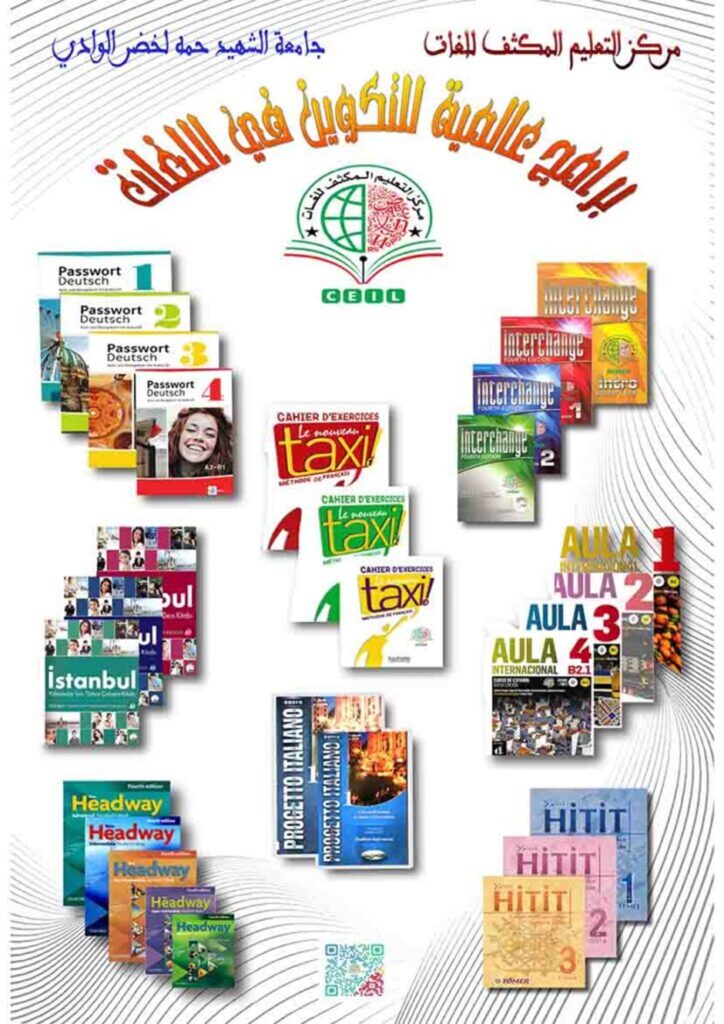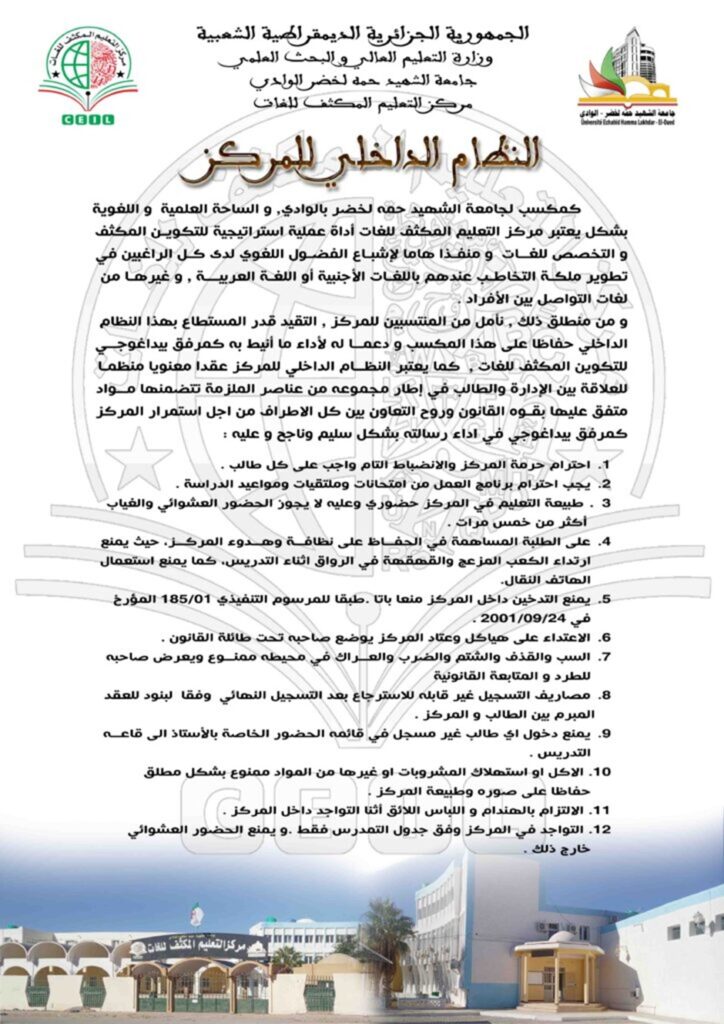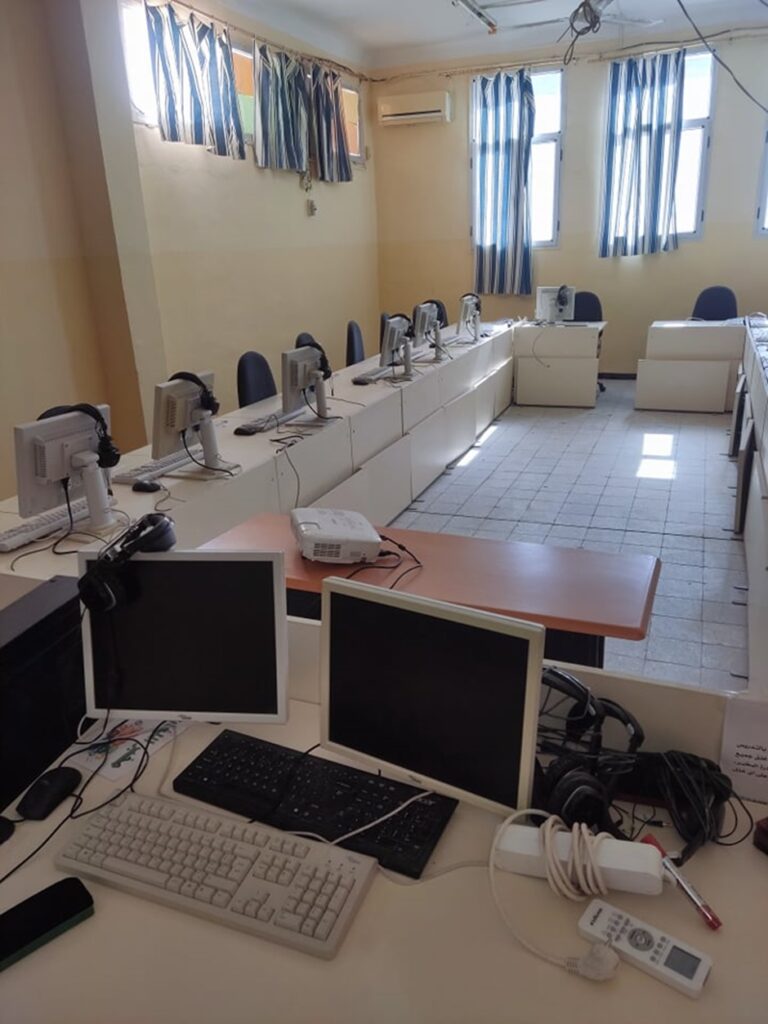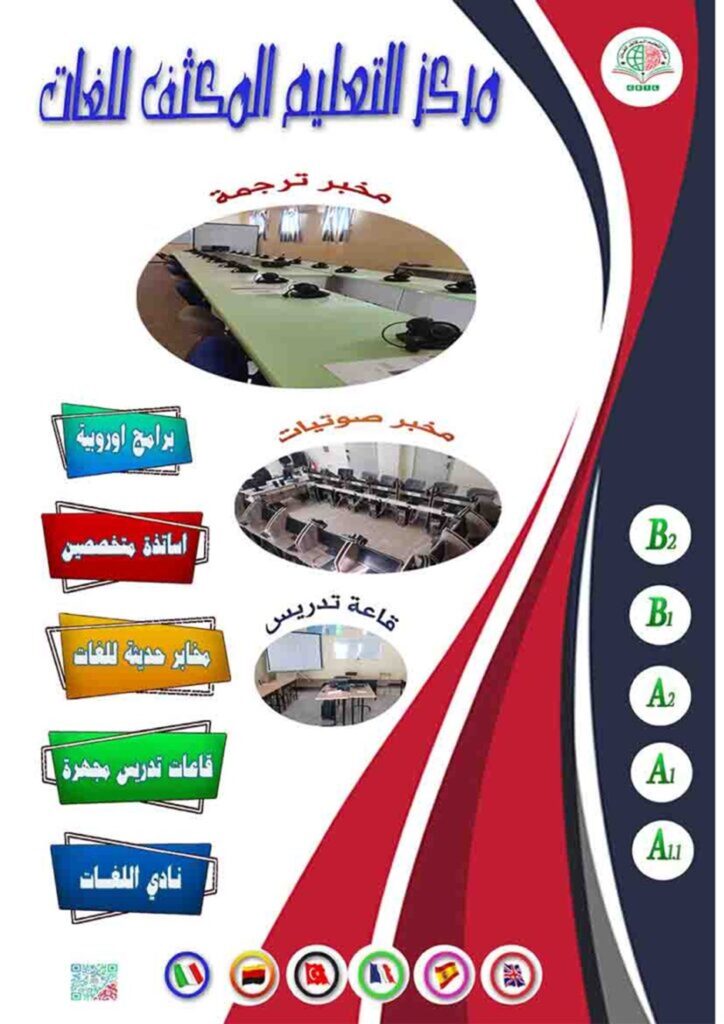4.3.3 “Vocational training events (lifelong learning) Host events at university that are open to the general public: executive education programmes (this refers to short courses for people who are not attending the university; this specifically excludes courses like MBA) and/or vocational training”
The University of El Oued is actively hosting educational events that are open to the general public. These events reflect the university’s commitment to lifelong learning, fostering a culture of shared knowledge and intellectual growth beyond its campus boundaries.
From workshops and seminars to conferences and awareness campaigns, the university provides opportunities for individuals of all backgrounds to engage with cutting-edge research, innovative practices, and topics of societal importance.
The Public Procurement System: Between Theory and Practice
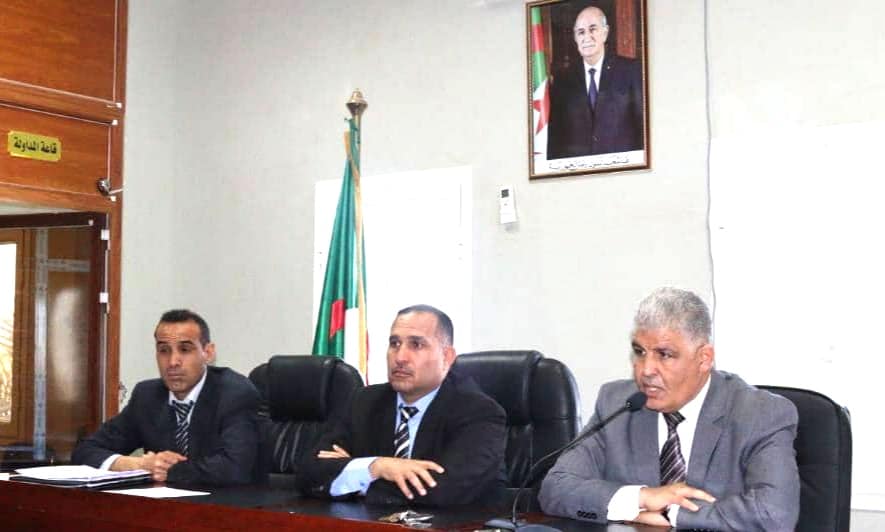
On Monday, March 13, 2023, the Faculty of Law and Political Science at the University of El Oued organized the National Training Seminar on “The Public Procurement System: Between Theory and Practice.”
The forum was inaugurated by Professor Omar Ferhati, the university’s rector, who welcomed the attendees and expressed his satisfaction and gratitude for selecting such important and useful topics for the training of the relevant sector. He emphasized the university’s role in contributing to and participating in such seminars, wishing them success and announcing the opening of the National Training Seminar.
The training event was attended by the university’s vice rector, the secretary-general of the university, deans of faculties, financial experts, and professors from various departments. They included experts in public procurement such as Hamana Abdelaziz from Guelma city and Bedjaoui Abdelrazak from the General Inspectorate of Finance, among others.
Dr. Mekki Derradji the Dean of the Faculty of Law and Political Science, welcomed the attendees and highlighted the significance of the forum in achieving benefit. Dr. Elias Djouadi, the seminar’s chair, also delivered a speech, acknowledging all participants and external professors, emphasizing the importance of the training day and encouraging active participation and engagement.
The main topics of the National Training Seminar revolved around the tender specifications, pre- and post-audit control of public procurement, and the virtual court. The seminar aimed to link the university institution with its economic environment by explaining important aspects related to preparing Standard Binding Document, a set of oversight mechanisms, the General Inspectorate of Finance’s oversight, and delving into specific details.
The seminar will continue for two days as workshops and discussions, concluding with practical recommendations.
Source:https://www.univ-eloued.dz/nat_for_pub_tra/

A training workshop in Master of ceremonies
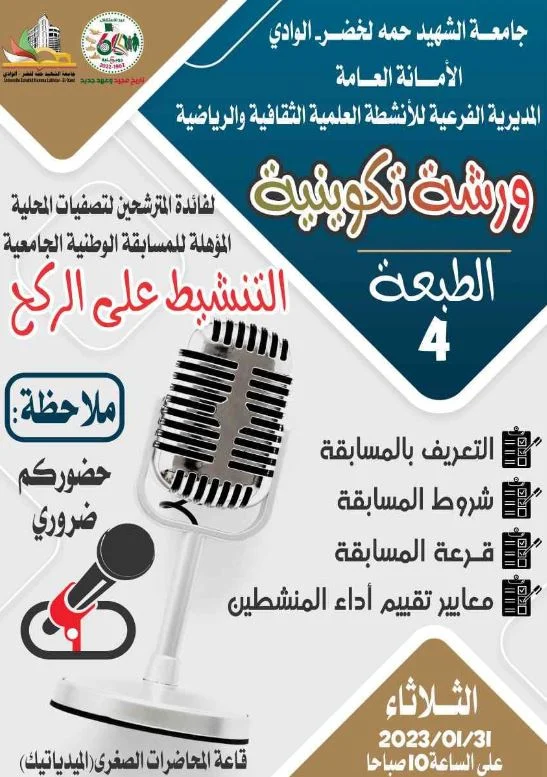
A training workshop in Master of ceremonies
As part of the preparation for the fourth edition of the National University Competition for Master of ceremonies, scheduled to take place in March 2023 at the University of El Oued, the Sub-Directorate for Scientific, Cultural, and Sports Activities is organizing a training workshop for participating students in the local competition. This workshop will include:
- Introduction to the competition
- Competition requirements
- Competition draw
- Evaluation criteria for participants’ performance
The workshop will be held on Tuesday, January 31, 2023, at the Small Lecture Halls in the Mediathek.
https://www.univ-eloued.dz/at_for_tr/source

The “Knowledge Day” Committee of University of El Oued holds its first meeting.
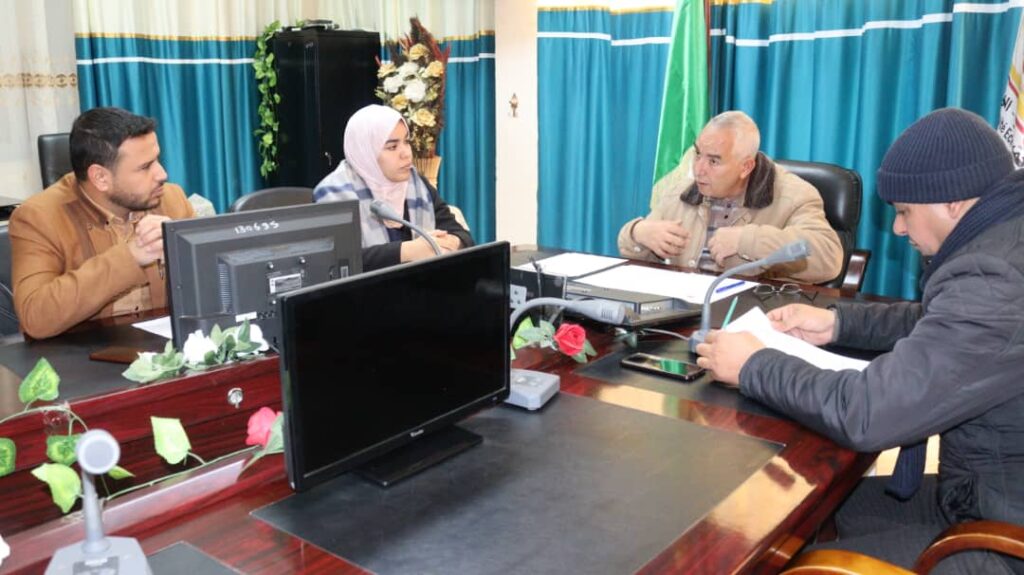
The “Knowledge Day” Committee of the University of El Oued holds its first meeting.
The “Knowledge Day” Committee of the University of El Oued convened for its inaugural meeting on Thursday, January 26, 2023, at the central meeting hall of the university’s administration.
Attendees:
- Dr. Khalifa Gaïd, Committee Chair
- Dr. Abdallah Reguig, Member
- Dr. Abdelkader Azzam Aouadi, Member
- Dr. Chouaïb Labiod, Member
- Dr. Raja Adaika, Member
The Committee Chair opened the meeting and welcomed the members to the committee’s first gathering. He emphasized the importance that Professor Omar Ferhati, the university’s rector, attaches to Knowledge Day and the significance of the University of El Oued being a pioneer and platform for scientific and cultural discourse within the framework of the university’s openness to its social environment. This includes inviting scholarly and cultural figures to the university to deliver lectures, and seminars, and benefit from their expertise.
The agenda included two key points: firstly, explaining the memorandum from the Secretary-General of the Ministry of Higher Education and Scientific Research, No. 2022/1936 dated December 14, 2022, regarding the designation of Knowledge Day in each university institution. Secondly, developing a program to propose the names of influential scientific and cultural figures in the Algerian arena to be invited to activate the university’s Knowledge Day event, with one personality suggested per month.
Regarding the first agenda item, the Committee Chair read out the Secretary-General’s memorandum and then provided a detailed explanation with input from the members. The memorandum, as stated, aims to enhance the openness of higher education institutions to their external environment by inviting scientific and cultural figures from across the national territory, in coordination with the relevant authorities in the province, to conduct lectures and meetings within the university environment at least once a month. The memorandum also highlighted that this initiative would enable Algerian universities to reclaim their natural and pioneering role in leading public discourse by attracting reputable scientific figures and embracing constructive ideas, as well as sharing leading cultural and artistic knowledge. This would inject vitality and dynamism into university life.
Regarding the second agenda item, after discussion and exchanging views, the attendees proposed a list of names of scientific and cultural figures to be contacted after presenting the names to the university’s rector for approval. They also discussed logistical and organizational aspects to ensure the success of Knowledge Day.
The proposed names are as follows:
- Professor Zouhour Wanesi Adeeba, former Minister
- Professor Mohammed Saleh Al-Sadik, scholar, writer, and historian
- Professor Abdelaziz Khalaf, economist and presidential office advisor
- Professor Abdelmajid Chiki, advisor to the President of the Republic on national archives and national memory
- Professor Saleh Balaid, Head of the Supreme Council for the Arabic Language
- Professor Abdelhamid Bouraio, anthropologist
- Professor BelKacem Haba, inventor and scientist
- Professor Nadal Jassim, astrophysicist
- Professor Riad Bouache, artificial intelligence researcher
- Nour Al-Din Ben Brahim, Head of the National Observatory for Civil Society
The Committee decided to postpone adding prominent names from literature and the arts for later discussion.
The members agreed that these proposed names remain within the scope of preliminary suggestions and will not be finalized until consultation and approval from the university’s rector, who may assist the Committee by adding or modifying the proposed names.
The meeting concluded at 12:00 PM on the same day, month, and year.
Committee Chair Dr. Khalifa Gaïd
Source:https://www.univ-eloued.dz/com_jm_ue/

The Intensive Languge Learning Centre(CEIL)
EL OUED University is supported by Intensive Language learning Center (ILLC) aims to establish a scientific and specialized knowledge space that supports the higher education system and scientific research at EL OUED University. It specifically focuses on providing intensive and specialized training, particularly in satisfying the linguistic curiosity of all its members (professors, staff, students, students international and non-academic students), developing foreign language communication skills for those interested in learning languages other than Arabic, both in speaking and writing, and teaching Arabic to non-native speakers.
Additionally, with the support and collaboration of the university administration, the canter strives to achieve its objectives by ensuring a comprehensive scientific curriculum in six languages: Arabic for non-native speakers, English, Chinese, Russian, Spanish, and French, as these are the six languages recognized in the United Nations system. Turkish, German, and other languages that are gaining prominence in the international, national, and local linguistic landscape are also included
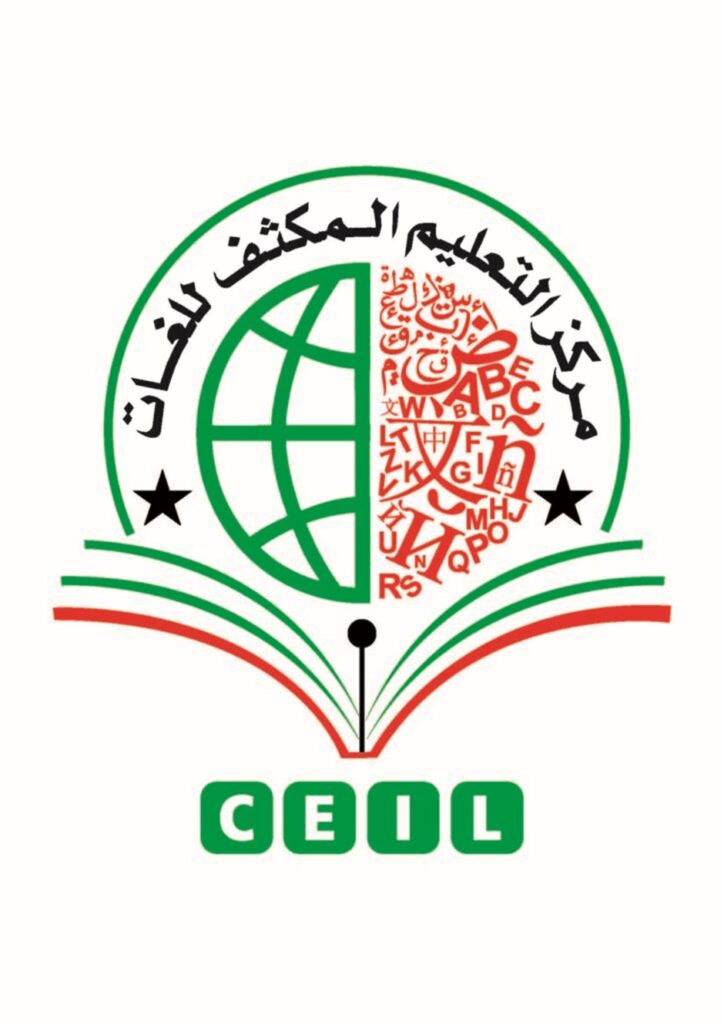
THE MESSAGE OF THE CENTER
The Intensive Language learning Centertakes on the following responsibilities:
- Ensuring technical support for vocational courses and enhancing proficiency levels, as well as updating knowledge in the languages offered by colleges and institutes.
- Overseeing the operation and maintenance of specialized language teaching equipment.
The center includes the following branches:
- Programming branch.
- Cleaning and maintenance branch.
The University of EL OUED is supported by an Intensive Language learning Center.
The Intensive Language learning Center (ILLC) aims to create a scientific and specialized knowledge space that supports the higher education system and scientific research at the University of EL OUED. It specifically supports the intensive and specialized training mechanism, particularly in satisfying the linguistic curiosity of all its members (professors, staff, students, international students, and non-university individuals). It also aims to develop foreign language communication skills for those interested in learning languages other than Arabic, both in speaking and writing. Additionally, it strives to teach Arabic to non-native speakers according to specialized programs.
With the support of the university administration and the assistance of professors, the center seeks to achieve the goal of providing intensive scientific training in six languages: Arabic (for non-native speakers, including foreign students and residents of the state or its surroundings), English, Chinese, Russian, Spanish, and French, as they are the six languages recognized by the United Nations, in addition to Turkish, German, and other languages that have started to gain importance in the international, national, and local linguistic landscape.
